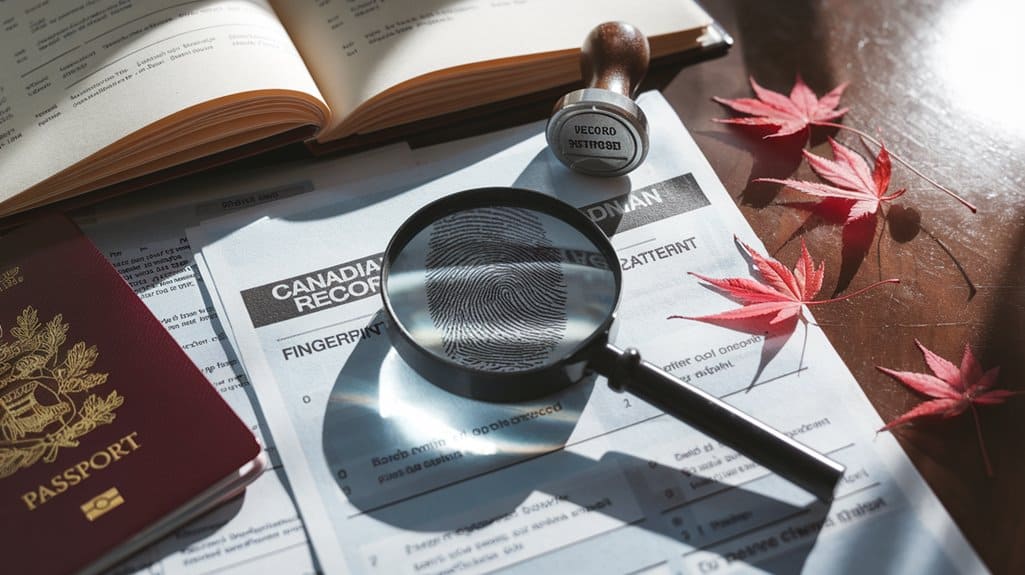
If you’ve got a criminal record that’s affecting your Canadian immigration status, a record suspension can help by sealing your record from public view. You’ll need to meet specific eligibility requirements, including waiting periods of 5-10 years after completing all sentences, and pay a $50 application fee. The process involves fingerprinting, gathering court documents, and submitting an application to the Parole Board of Canada. Further exploration will reveal additional options for addressing criminal inadmissibility.
Understanding Record Suspensions and Their Impact on Immigration
Record suspensions, formerly known as pardons in Canada, play an essential role in immigration matters by allowing individuals with criminal records to potentially overcome inadmissibility issues.
When you obtain a record suspension, your criminal record is sealed and kept separate from other criminal records, which can improve your chances of entering Canada or maintaining your immigration status.
You’ll need to meet specific eligibility requirements, including waiting periods after completing your sentence and having no Schedule 1 offences involving minors.
The process involves submitting an application to the Parole Board of Canada, along with fingerprints and supporting documents.
While a record suspension doesn’t erase your conviction, it can remove barriers to employment, travel, and citizenship applications, demonstrating to immigration authorities that you’ve been rehabilitated and are leading a law-abiding life.
Eligibility Requirements for Record Suspension Applications
Before you can apply for a record suspension in Canada, you’ll need to meet several strict eligibility requirements established by the Parole Board of Canada.
You must have completed all sentences, including fines, surcharges, probation, and imprisonment periods. The waiting period after completing your sentence varies: 5 years for summary convictions and 10 years for indictable offences.
You can’t have been convicted of Schedule 1 offences, such as sexual crimes involving minors, or have more than three indictable convictions resulting in two-year-plus prison sentences.
Additionally, you’ll need to demonstrate good conduct and prove you haven’t received new criminal charges during the waiting period.
You must also be a Canadian citizen or legal resident and pay the required application fee.
The Step-by-Step Application Process
Once you’ve confirmed your eligibility for a record suspension, you’ll need to navigate through a detailed application process that involves multiple steps and careful documentation.
First, you’ll need to get your fingerprints taken at an accredited fingerprinting company or police service. Next, gather your court documents, police records, and military conduct reports if applicable.
You’ll then complete the official application form from the Parole Board of Canada, ensuring all sections are filled out accurately.
Submit your application package with the required $50 processing fee and all supporting documentation. The RCMP will verify your information and conduct a background check.
Be prepared for a waiting period of 1-2 years while your application is processed. During this time, maintain your law-abiding behaviour, as any new offences will affect your application.
Waiting Periods and Processing Timelines
Understanding the waiting periods involved in record suspension applications helps you plan your timeline effectively.
You’ll need to wait 5 years after completing your sentence for summary offences and 10 years for indictable offences before you can apply.
Once you submit your application, the processing time typically ranges from 1 to 2 years. During this period, the Parole Board of Canada will review your case, verify your documents, and conduct necessary background checks.
You’ll want to prepare your documentation well in advance, as gathering all required materials can take several months.
If your application is refused, you can reapply after one year.
Remember that certain offences, like sexual crimes involving minors, aren’t eligible for record suspensions regardless of waiting time.
Criminal Inadmissibility and Record Suspensions
While obtaining a record suspension can seal your criminal record in Canada, it doesn’t guarantee international travel privileges or immigration admissibility.
You’ll need to understand that even with a record suspension, you may still face restrictions when entering other countries or applying for immigration status.
If you’re seeking to overcome criminal inadmissibility, you have several options available.
You can apply for a Temporary Resident Permit (TRP) for short-term entry, pursue criminal rehabilitation after five years have passed since completing your sentence, or obtain a record suspension if your conviction was in Canada.
The path you’ll need to take depends on where your conviction occurred, the type of offence, and how much time has passed since completing your sentence.
Alternative Options for Overcoming Criminal Records
Beyond record suspensions, several alternative pathways exist for individuals seeking to overcome their criminal records in Canada.
You can apply for a Temporary Resident Permit (TRP), which allows temporary entry despite inadmissibility. This option is particularly useful when you need immediate entry and can’t wait for other processes.
Another option is criminal rehabilitation, which comes in two forms. If enough time has passed since your offence, you may qualify for deemed rehabilitation without applying.
For more recent cases, you’ll need to pursue individual rehabilitation by demonstrating good behaviour and submitting a formal application. You must wait at least five years after completing your sentence to apply, and you’ll need to prove you’re unlikely to re-offend.
Common Challenges and Solutions in Record Suspension Cases
Maneuvering the record suspension process often presents several common roadblocks that can delay or derail your application.
You’ll need to navigate challenges like missing documentation, incomplete court records, or unpaid fines that can greatly impact your success. Understanding these obstacles and their solutions will help you avoid common pitfalls.
- Outstanding fines or restitution orders must be paid in full before you can proceed with your application.
- Incomplete or inaccurate criminal record checks can delay processing – always double-check your documentation.
- Missing court information from different jurisdictions requires coordinated efforts to gather all necessary records.
If you encounter these challenges, you’ll need to address them systematically.
Working with proper authorities to resolve documentation issues and maintaining detailed records of all correspondence will help guarantee your application moves forward smoothly.
Record Suspensions for International vs. Canadian Convictions
Since record suspensions operate differently for international and Canadian convictions, you’ll need to understand the distinct procedures for each type.
Understanding the differences between international and Canadian record suspensions is crucial for navigating the path to clearing your criminal record.
For Canadian convictions, you must apply directly to the Parole Board of Canada for a record suspension after waiting 5-10 years from completing your sentence. Once granted, this suspension effectively seals your record within Canada.
For international convictions, you can’t obtain a Canadian record suspension. Instead, you’ll need to pursue rehabilitation through Canadian immigration authorities or seek a pardon in the country where the conviction occurred.
If you’re deemed rehabilitated or granted a foreign pardon, you’ll still need to disclose your conviction when entering Canada, but you may be considered admissible depending on the specifics of your case.
Recent Changes in Record Suspension Legislation and Policies
The Canadian government’s approach to record suspensions has undergone significant changes in recent years, with Bill C-31‘s introduction in June 2021 marking a notable attempt at reform.
While this bill didn’t become law, it highlighted the government’s commitment to modernizing the record suspension system.
You’ll find several key changes that have been implemented:
- The application fee has been reduced to $50 as of January 1, 2022
- Processing times have been streamlined for certain applications
- Digital submission options have been expanded for supporting documents
The Parole Board of Canada continues to adapt its policies to make record suspensions more accessible while maintaining public safety standards.
You’ll need to stay informed about these changes, as they can affect your eligibility and application process for criminal record suspensions.
How Canadian Currents Immigration Can Help
Steering through Canada’s complex immigration and record suspension processes requires expert guidance, which is precisely what Canadian Currents Immigration can provide.
Our team of immigration lawyers, consultants, and paralegals brings decades of combined experience to help you navigate the record suspension application process efficiently and effectively.
We’ll work closely with you to determine your eligibility, gather the necessary documentation, and guarantee your application meets all requirements.
Our professionals understand the nuances of criminal inadmissibility and can help you explore all available options, from temporary resident permits to criminal rehabilitation.
We’ll tailor our services to your specific situation, whether you’re dealing with Canadian or foreign convictions, and guide you through each step of the process to achieve the best possible outcome.
Frequently Asked Questions
Can I Travel While My Record Suspension Application Is Being Processed?
You can still travel while your record suspension is being processed, but you’ll face the same restrictions as someone with a criminal record until the suspension is officially granted.
What Happens if I Commit a Minor Offense During the Waiting Period?
If you commit any offence during the waiting period, your eligibility clock restarts. You’ll need to begin a new waiting period after completing the sentence for the new offence.
Do Provincial Offenses Like Traffic Violations Affect Record Suspension Eligibility?
Minor provincial offences like traffic violations won’t affect your record suspension eligibility. You’ll only need to worry about criminal offences under the Criminal Code of Canada or federal drug laws.
Can Employers Still See My Criminal Record After Receiving a Suspension?
Once you receive a record suspension, employers can’t see your criminal record during background checks. The record is sealed and kept separate from publicly accessible criminal records.
How Does Declaring Bankruptcy Impact My Record Suspension Application?
You’ll need to wait until your bankruptcy is discharged before applying for a record suspension. Outstanding bankruptcy can delay your application process with the Parole Board of Canada.
Conclusion
If you’re seeking Canadian immigration with a criminal record, obtaining a record suspension can greatly improve your chances of success. You’ll need to meet specific eligibility requirements, wait the appropriate period, and complete a thorough application process. While it’s a complex journey, understanding the process and working with experienced professionals can help you navigate the system effectively and move forward with your immigration goals.

We serve ALL of Canada. Currently have offices Western Canada — Vancouver, Calgary, Edmonton, Kamloops and Red Deer. We also have the infrastructure to work with any of our clients virtually — even from the furthest regions of the Yukon to Newfoundland.
Call (778) 331-1164 [toll free 1 (844) 715-0940] to get routed to the best office for you or contact us online to schedule an appointment.
We also have a dedicated intake form to help you get the ball rolling. Our intake team will review your specific case and advise you on the next steps to take as well as what to expect moving forward.
Our offices are generally open 8:30 a.m.—4:30 p.m., Mon—Fri.

Aleksandra Koscielak
IMMIGRATION CONSULTANT
With an exceptional record of success in immigration consulting and business strategy, Aleksandra brings extensive expertise as a senior licensed immigration consultant. Her deep understanding of business strategies and processes enables her to advise executives on the best immigration solutions confidently.



